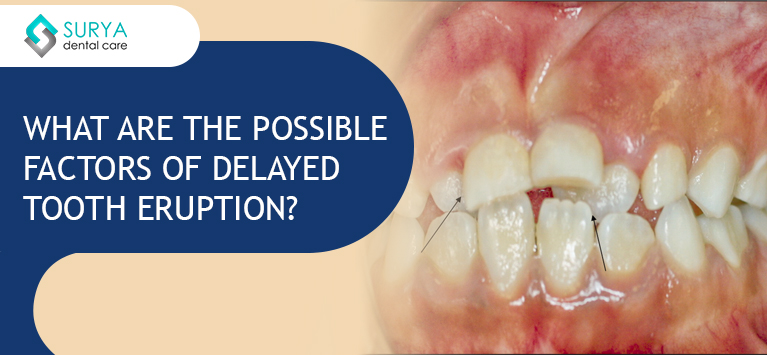
Teeth development for babies also takes place during the menstruation cycle. An infant has most of its teeth developed beneath its gums during delivery. You can witness the teeth only after they breakthrough the gums and this is known as eruption. Normally, the teeth begin to erupt when a baby is aged 6 months old.
Subsequently, each tooth begins to erupt gradually at various stages of infanthood. By the age of 3, your toddler will have 20 milk teeth (also known as baby teeth).
If you notice your little champ does not get any teeth until 9 months, consult your pediatric dentist. It is not just a matter of dental concern but perhaps a warning sign of bodily disorder.
In this article, our child dentist has listed the possible conditions that intrude the teeth eruption and make kids don’t get their teeth within the right timeframe. This is known as delayed tooth eruption.
What are the possible factors of delayed tooth eruption?
Teeth eruption shows natural variations in timing for each child, which are pretty normal. On the other hand, the following are the problematic conditions that can interlude the eruption process.
1) Genetic Abnormalities
We noticed many kids encounter a delay in tooth eruption due to genetics. As it happens with family patterns, this delay is harmless. So you don’t need to worry about this.
On the other hand, Various problematic conditions like Apert Syndrome that are carried by genes also trigger a delay in eruption. In simply, delayed tooth eruption is a sign of such detrimental conditions.
Hence we advise you to get a dental consultation for your kid if he/she does not get teeth in the standard timeframe. This consultation may help you to pinpoint the underlying disorders as well.
2) Nutritional deficiency
As stated earlier, teeth development begins when a kid is in the womb. The teeth begin to develop at the 6th week whereas the tooth buds from at 8th week and hard tissues around the teeth formed at the 10th week.
If the expectant mother does not get proper vitamins and nutrients during pregnancy, it will affect the baby’s teeth development as well. This also leads to delay in teeth eruption.
3) Developmental Disorders
Developmental disorders such as hypopituitarism, panhypopituitary, hypothyroidism, and others have an indirect attack on oral health. It incites a delay in teeth eruption.
For instance, hypopituitarism weakens the pituarity glands and affects their hormone production. Likely, hypothyroidism tends to shortage of thyroid hormones. Dentists found that such hormonal imbalance in babies interrupts the eruption and eventually ends in delayed tooth emergence.
4) Down’s Syndrome
Delayed teeth eruption is a common consequence of Down’s syndrome. It is a genetic disorder and occurs with atypical cell division. This is linked to consequences like physical growth delays, intellectual disability, and much more.
This condition has a harmful effect on dental eruption also.
Normally, kids would get all of their baby teeth by age 3 but a kid suffering from Down’s Syndrome would get all of their primary teeth by age 4 or 5.
5) Prematurity & Low birthweight
We have noticed various dental effects such as thin enamel, crown dilacerations, palatal distortions, and delayed dental eruption. Researchers also ensured that the preterm babies are highly vulnerable to delayed tooth eruption.
It might happen because their immune system is not fully developed so they have various oral and health disorders.
Delayed dental eruption is not a serious concern for premature babies as the teeth begin to erupt for them by 8 months. It means the dental eruption is retarded for those preterm and low birth weight babies for around 1 to 2 months.
Bottom Line
Normally, the teething begins when a baby is 6 months old. Then the eruption undergoes a typical pattern and it involves 4 teeth by 11 months, 8 teeth by 15 months, 12 teeth when the baby is aged 19 months, 16 teeth around 23 months, 20 teeth by 27 months.
This pattern is disturbed with various components that eventually end in delayed dental eruption. Such factors might be benign or venomous so that a dental consultation with a child dentist is mandatory to detect the existing problem underneath the surface.



